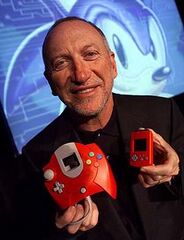Difference between revisions of "Bernie Stolar"
From Sega Retro
m (Text replacement - "==Production History==" to "==Production history==") |
|||
| Line 37: | Line 37: | ||
* ''[[NFL 2K]]'' (1999) — Special Thanks | * ''[[NFL 2K]]'' (1999) — Special Thanks | ||
| − | |||
[[Category:Sega Executives|Stolar, Bernie]] | [[Category:Sega Executives|Stolar, Bernie]] | ||
| + | [[Category:Sega of America employees]] | ||
Revision as of 16:03, 20 March 2017

|
| Bernie Stolar |
|---|
| Role(s): Executive |
Bernard "Bernie" Stolar worked in the video game industry for several important companies. His career started at Atari where he worked initially in the coin-op arcade division and eventually moved over to the home division being in charge of platforms like Atari Lynx. Before the US release of the PlayStation game console, Sony made Stolar the first president of SCEA and in charge of the PlayStation platform. Stolar ruled with an iron fist and forced some unpopular policies with regard to titles licensed including a "no-RPG" policy seeing as RPGs at the time were almost all 2D, didn't sell well in North America and in his opinion failed to show the power of the PlayStation in a positive light.
After the first holiday season in the US the PlayStation was a success selling well. Bernie was then offered the opportunity to leave Sony and take the helm at Sega of America managing the Sega Saturn. Stolar while not as strict with licensing policies at Sega as he was at Sony decided against bringing over many of the most popular Saturn titles citing limited appeal in North America and failure to show off the Saturn in as positive of a light as possible as reasoning. As the Saturn continued to struggle in North America, Stolar pressed for Sega to develop a new platform which would eventually become the Dreamcast. While Stolar left the company a month prior to the US release of the system, Stolar is infamously credited by many Sega fans, for helping kill the Saturn prematurely in favor of developing the Dreamcast.
Stolar is fondly remembered for his "Saturn is not our future." remark in the 1997 E3 not to mention his "There is no more Tekken." line during a TV interview (which followed after Namco confirmed supporting Sega's console starting with Soul Calibur). The Tekken line was also Stolar's stab against Sony and its next generation plans, although Namco confirmed later that the PlayStation2 will be getting Tekken games exclusively.
Aside from that, there were insider reports that he actually went against his Japanese superiors by pricing the Dreamcast with a launch price of $199 (which he unveiled in a speech in early 1999, to standing ovation). Reportedly, Sega Japan wanted to price the DC at $249 in order to be very profitable right from the start. Prior to the Dreamcast's American launch in 1999, Stolar was fired and received a $5,000,000.00 severance package from Sega.
Production history
- The Raiden Project (1995) — Special Thanks
- Jumping Flash! (1995) — Special Thanks
- Aquanaut's Holiday (1995) — Special Thanks
- Sega Worldwide Soccer 97 (1996) — Special Thanks
- Daytona USA: Championship Circuit Edition (1996) — Special Thanks
- Dark Savior (1996) — Special Thanks
- Crash Bandicoot (1996) — Special Thanks
- Cyber Troopers Virtual-On (1997) — Special Thanks
- Virtua Fighter 2 (1997) — Special Thanks
- Quake (1997) — Special Thanks
- NBA Action 98 (1997) — Special Thanks
- World Series Baseball '98 (Saturn Version) (1997) — Special Thanks
- Manx TT Superbike (1997) — Special Thanks
- The Lost World: Jurassic Park (Mega Drive Version) (1997) — Sega Special Thanks to (Sega of America Credits)
- Sega Touring Car Championship (Saturn Version) (1997) — Special Thanks
- Sega Smash Pack (PC Version) (1998) — Special Thanks
- Panzer Dragoon Saga (1998) — Special Thanks
- Sonic Adventure (1998) — Executive Management
- NFL 2K (1999) — Special Thanks